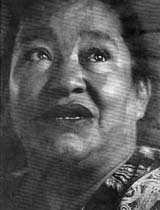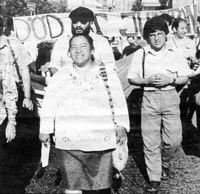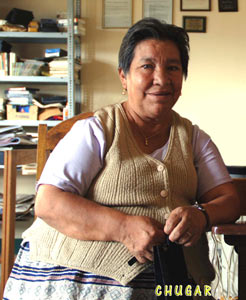
Domitila, A Woman of the Mines
by Víctor Montoya
(Translation by S. Sándor John)
The neighbors called her Doña Domi. It seemed I had known her forever, living in the Siglo XX mine district where she sold the spicy turnovers called salteñas out of a wicker basket – freshly made with the help of her little daughters, who peeled the potatoes and shelled the peas before they went to school. By then she was no longer a palliri,* having become a leader of the Housewives’ Committee. It was the 1970s, and Bolivia was going through one of the darkest chapters in its history.
Sometimes we ran into each other at demonstrations against the military dictatorship of Hugo Banzer Suárez. We would also see each other at the tremendous rallies in the Miners’ Plaza, with its monument to union leader Federico Escóbar Zapata, bust of César Lora and headquarters of the Siglo XX Mine Workers’ Union. We gave anti-imperialist speeches from the balcony of the union hall, with Domitila speaking on behalf of the housewives and the author of these lines as a representative of the high-school students of Bustillos province and president of the Primero de Mayo School.
I also remember her aged father, a Chaco War veteran who was the father of six daughters from his first marriage. Don Ezequiel, retired from the mining company and always concerned about providing for his family, walked the streets of Llallagua selling clothing door to door. What was different about him was that in addition to selling clothes, he also evangelized, bringing Christ’s message to the poorest of the poor. I met him one day when he came to offer us pants made in Brazil. My mother invited him into the living room. After I tried on a few pairs, we bought one for cash and another on credit. When I told him that one of the pairs was too long on me, he used his wonderful tailor’s hands to fix it in no time at all. After he had bid us goodbye, with all the warmth and respect that characterized his relations with others, I told my mother that Don Ezequiel had the same kind of beard as Old Man Trotsky. She smiled and nodded at my comment.
In 1975, Doña Domi was invited to attend the United Nations’ International Women’s Year Tribunal in Mexico. Her participation in this major event made the news, as she attacked “the standpoint of Western lesbians, prostitutes and feminists,” explaining that women’s struggle is not against men and that women’s liberation cannot be achieved outside the framework of a people’s socioeconomic, political and cultural emancipation. Doña Domi was convinced that the struggle for liberation means replacing the capitalist system with another kind of society, in which men and women would have the same rights to life, education and work. She stressed that the fight for freedom and social justice is not a struggle between the sexes, between male and female, but a struggle by both as a couple against a socioeconomic system that oppresses men and women alike.

Challenging her adversaries for access to the microphone, she said that in a society divided into classes there is a difference, not only between the bourgeoisie and the proletariat, but among women as well: between a woman academic and a maid, the wife of a millionaire and the wife of a miner, a woman who has it all and one who has nothing. Speaking as the wife of a mine worker, mother of seven children and leader of the Housewives’ Committee, Doña Domi had a strong impact among even the most hard-line feminists, and her interventions were widely discussed around the world. Her words transmitted the wisdom of the popular classes and everything she had learned in the miners’ unions and the school of life itself. Dazzled by the powerful words of this simple woman who knew how to simplify the most complex theories regarding the class struggle and woman’s emancipation, the Brazilian educator and journalist Moema Viezzer decided to follow her to the Siglo XX mine camp, in order to write the book Let Me Speak: Testimony of Domitila, A Woman of the Bolivian Mines [title of the English translation, published in 1979 by Monthly Review Press]. First published in Mexico [under the title Si me permiten hablar] and then translated into several languages, the book became one of the best-known texts among feminists of every description.
The mine workers, in their victories as well as their defeats, always relied on the unconditional support of their wives and children, who acted as their natural class allies since the earliest days of the Bolivian labor movement. Thus it was that I found myself side by side with Doña Domi once again, at the National Miners’ Congress in Corocoro, which was inaugurated on May Day 1976. It was there that she called for organizing a National Housewives’ Federation as an affiliate of the Central Obrera Boliviana (COB–Bolivian Labor Federation), while the workers cried out for their just demands, insisting that the government decree a general amnesty and respect trade-union liberties.
Weeks later, after the miners’ strike on June 1976 was defeated and the army had occupied the town of Llallagua and Siglo XX, I met her inside a mineshaft where the leaders of the struggle had taken refuge from the brutal persecution unleashed by the government. Doña Domi was in the last month of a pregnancy, and her abdomen seemed like a huge fist of outrage. The decision was made to take her to a safe place where she could give birth in better conditions. Later we heard that she had had twins: a baby girl who was born alive and a boy who was born dead, likely affected by the malignant gases of the mine. When he was taken from her womb, his body was almost decomposed.
In early January 1978, by which time I was in political exile in Sweden, her name appeared once again in the press when she joined the hunger strike launched by four miners’ wives and their fourteen children in the offices of the Archbishop of La Paz. The aim of the hunger strike, which began on December 28, 1977, was to demand that the government democratize the country, restore the jobs of the workers who had been fired, withdraw army troops from the mine regions, and grant unrestricted amnesty to political and union leaders. This was a heroic and unprecedented struggle, as no one could imagine that a hunger strike undertaken by Aurora de Lora, Nelly de Paniagua, Angélica de Flores and Luzmila de Pimentel could spell the end of a military dictatorship which was dead set on holding on to power as long as it could. The days went by and history changed its course: the four women – backed by priests, workers, students and peasants who kept joining the hunger strike in different parts of the nation’s capital, together with the waves of protest that spread through the country – succeeded in pushing back the iron fist of General Hugo Banzer Suárez, who backed down and decided to call general elections on July 9, 1978. Doña Domi and the valiant women of the mines had showed the world, once again, that a spark in a powder keg can detonate an enormous social explosion, and that no dictatorship is stronger than the popular will.

Years later, in Stockholm, we met again and embraced each other. This was after the bloody coup led by colonels Luis García Meza and Luis Arce Gómez in July 1980, while Domitila was participating in an international women’s conference in Copenhagen. We knew that this horrific coup, which left a trail of dead and wounded, was financed by drug traffickers’ “narco-dollars,” and that the colonels used paramilitaries recruited by Klaus Barbie, the Nazi “Butcher of Lyon,” to help them take over. A meeting was held in Kungsträdgården (King’s Garden), and the two of us marched side by side, amidst banners and placards, as the protest wound through the streets of Stockholm.
In Sweden, the right of family reunification made it possible for her to be reunited with her children. Here, she found Latin American women rebelling against a past filled with servitude and submission; they were protected by laws that defended their most basic rights and established the basis for equality with men. Perhaps without knowing it, she was in a country that had overcome gender inequalities and toppled the pillars of patriarchal society. The emancipation of women went from dream to reality. Instead of male chauvinism, the feminism that emerged from the 1960s became one of the decisive forces within the Swedish left, as activists combined the reading of Marxist classics with the works of Alexandra Kollontai, Simone de Beauvoir, Alva Myrdal and other women fighters whose intelligence could disarm one and all.
Doña Domi quickly understood that despite the nation’s consumerism and a certain lack of human warmth, the women of Sweden had already won some of their rights in the first part of the 20th century. In 1919 they gained the right to vote, and some years later the right to divorce; in 1938 contraceptives were legalized, and in 1939 a law was approved specifying that women could not lose their jobs due to marriage, pregnancy or giving birth. The year 1947 saw the first woman in government, and in 1974 the norm was established that both parents have a right to a total of 390 days to take care of their children, while receiving 80% of their pay. Further still, in 1975 abortion was legalized and made free of charge for all women, and in the 1980s the first law went into effect prohibiting gender discrimination in the educational system and the labor market. On top of this, women no longer faced the need to choose between having a family and pursuing a professional career, thanks to a broad system of social security and child assistance.
So it came to pass that Doña Domi, without losing sight of the idea that another world is possible, learned the lesson that in this country it was possible for women’s demands to be won little by little, so why wouldn’t it be feasible to do the same in other countries where women want to turn their nightmares into dreams, and their dreams into reality?
With this question and her new experiences in life, which let her see that women as well as men can enjoy the same rights and responsibilities, she started planning her return to Bolivia, once democracy was restored. She left her children in Sweden and followed the call of the Pachamama [Andean earth goddess], to continue fighting for a future that would be more worthy than the present. This time, she was more convinced that in order to achieve women’s liberation, it is necessary not only to change a country’s socioeconomic structures, but people’s mentality and the norms according to which its citizens interact with each other too. Despite her history of being persecuted, jailed and tortured, Doña Domi refused to be silent. She continued to demand her right to speak against social injustice, with the same conviction and courage she had always displayed. Her personal testimony is a superlative lesson in life and struggle. If you don’t believe me, I invite you to read Moema Viezzer’s Let Me Speak! and David Acebey’s ¡Aquí también, Domitila! [no English translation has been published], two books that bring together the best of Doña Domi, an indomitable woman of the mines.
___________
* Palliri: Woman worker who hammers rocks (usually outside the mines) to extract
the minerals they contain.
______________
VÍCTOR MONTOYA
was born in La Paz (Bolivia) in 1958. He spent his childhood and early youth
in the miner's town of Siglo XX-Llallagua, north of Potosí, where the largest
vein of tin in the world was discovered. In 1976 he was persecuted, tortured,
and jailed. He remained in the concentration camp of Chonchocoro-Viacha until,
in 1977, he was freed following a campaign by Amnesty International. Since
then he has resided in Sweden, where he is dedicated professionally to literature.
![]() montoya (a) tyreso.mail.telia.com
montoya (a) tyreso.mail.telia.com
![]() Más
artículos del autor:
Pulsa aquí
Más
artículos del autor:
Pulsa aquí
* Imágenes del artículo remitidas por el autor.
![]() Versión en inglés de este artículo /
Versión en inglés de este artículo /
![]() Versión en francés /
Versión en francés /
![]() Versión en italiano /
Versión en italiano /
![]() Idioma original
Idioma original
▫ Artículo publicado en Revista Almiar, n. º 49, noviembre-diciembre de 2009. Reeditado en julio de 2019.


